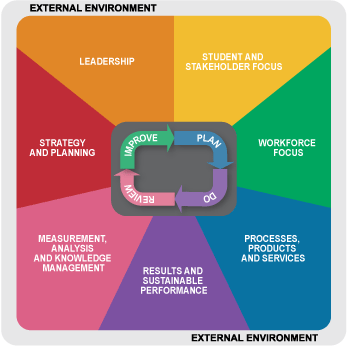Excellence Framework
For Staff – further details, information and supporting documentation is available on the Academic Quality and Standards SharePoint site. Please note access to this site requires an ECU staff login.
The ECU Excellence Framework is an integrated quality improvement system that describes the elements and organisational characteristics essential to sustaining high levels of performance at the University.
The Framework replaces the Quality@ECU model. It can be used to access and improve any aspect of ECU’s operations and activities, including:
- academic quality;
- strategy and planning;
- people, information and knowledge;
- safety;
- services delivery; and
- organisational sustainability results.
The Framework has been incorporated into ECU activities, including management for performance, centre reviews, professional accreditation and school reviews. The value of applying the Framework will be evident when staff engage in these activities as part of their work.
Who is responsible for excellence?
The simple answer is: everyone. Whether your role involves teaching, research, provision of services to students/staff, engagement with external stakeholders or some combination of these, the University’s value of Personal Excellence should be part of everything that you do.
How is the Excellence Framework used?
Everyday work:
Your annual Work Plan can be created, carried out and reviewed using the Framework as a guiding structure.
Development of new processes, products and services:
Should be informed by the Framework during the planning stage and then followed through during implementation, review and ongoing improvement. The Framework allows the right questions to be asked against each of the seven categories at each stage of the process, ensuring that nothing critical is overlooked.
Policies and guidelines:
Will progressively incorporate the Excellence Framework. Some of this work has already been done for professional accreditation, benchmarking, consultative committees, Management for Performance, annual reviews and school reviews. Using the policies and guidelines as intended ensures their maximum value is realised. As policies and guidelines are reviewed, the Framework will be incorporated where appropriate.
Why is the Excellence Framework important?
The Excellence Framework gives schools and centres a systematic approach to:
- planning, implementation, review and improvement of processes, product and services
- ensuring that all the right questions are asked at the right times to achieve the right outcomes
This makes it possible to ensure that all the aspects that contribute to the achievement of excellence outcomes for a project are taken into account.
What are the key features of the Framework?
The Framework is made up of seven categories. Each category covers critical aspects that contribute to excellence, regardless of the activity or content.
Each category is further divided into a number of items. While the categories and items relate to how things are done at ECU, it is important to realise that this happens within the context of an external environment that must be taken into consideration.
- ECU-Excellence-Framework-Hub - PDF File, 301.9 KB
- Key-Features-of-the-Framework - PDF File, 127.1 KB
The seven categories are underpinned by nine principles of excellence. These principles have emerged as a result of research and proven application in diverse organisations over a number of decades. The principles have been used to develop the detail of the categories and as a mechanism for aligning processes and practices of the Framework.
- Key-Principles-of-the-Framework - PDF File, 102.7 KB
A critical component of the Framework is the Plan/Do/Review/Improve (PDRI) continuous improvement cycle. Applying PDRI to the systems, processes, policies and performance for each of the categories draws on a sound, time-tested quality improvement approach.
Contact
For further information contact Academic Quality and Standards.
Email: aqs@ecu.edu.au
